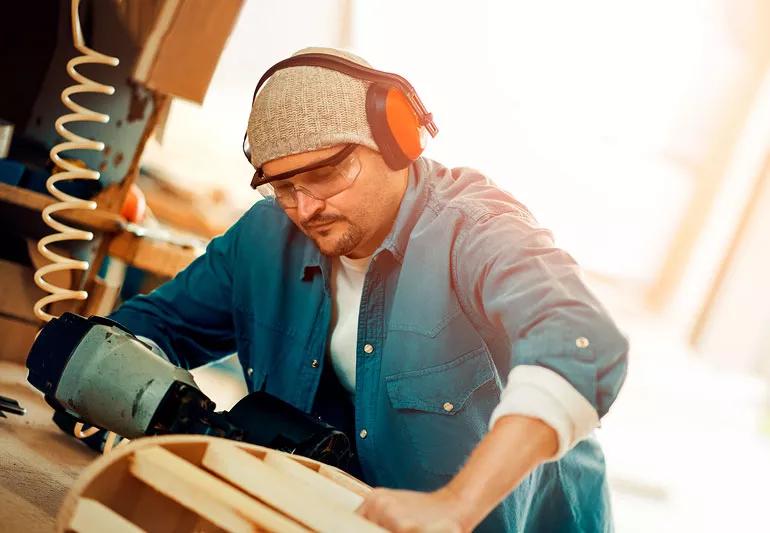Turning up the volume on occupational hearing loss

Your local librarian may be on to something. Occupational hearing loss is a common work hazard. Audiologist Sharon Sandridge, PhD, pumps up the volume on occupational hearing loss and shares tips for protecting yourself.
Advertisement
Cleveland Clinic is a non-profit academic medical center. Advertising on our site helps support our mission. We do not endorse non-Cleveland Clinic products or services. Policy
About 22 million workers are exposed to dangerous noise levels each year, according to the U.S. Centers for Disease Control and Prevention (CDC). “What matters is the level of noise and how long your exposure lasts,” Dr. Sandridge explains.
“It’s like aspirin. There is a maximum dosage, and it accumulates,” she says. “Even if you are in and out of sounds, very intense sounds fatigue the ear faster.”
There are two ways you can hurt your ears:
Some hearing math:
Advertisement
To put these numbers in context (“What is 85 dB? My toddler shrieking for a snack?”), take a look at these common sources of noise and their general decibel levels:
Motorcycle
Rock concert:
Firecrackers:
Factory workers: According to the CDC, almost half of all people in manufacturing have been exposed to hazardous noise levels. “Factory noise is the No. 1 cause of occupational hearing loss,” says Dr. Sandridge. But she also notes that the U.S. Occupational Safety and Health Administration (OSHA) has regulations in place to protect factory workers.
Entertainment venue employees: Every time fans “make some noise,” they put their ears at risk. Who knew there was a dark side to rooting for the home team? Stadiums or arenas with closed roofs or domes are especially dangerous since sound can’t escape.
Musicians: It’s not all about that bass, either. “If you play in an orchestra, you practice six to eight hours a day and perform for two to three hours a week,” explains Dr. Sandridge. “If your practice room is reverberant, you are at major risk.”
You don’t need to be a percussionist or electric guitarist to feel the effects. In a Cleveland Clinic pilot study, Dr. Sandridge’s team found that violinists reached their maximum weekly sound dose in just four days.
Farmers: Old McDonald should invest in earplugs to go with the farm. Research shows that almost 75% of farmers experience hearing loss as they get older. “They’re at significant risk when using tractors with open windows or without cabs,” notes Dr. Sandridge.
Dental workers: “Dentists who do a lot of drilling run the risk of having high-frequency hearing loss. The drill sound is intense, and they’re close to it,” says Dr. Sandridge. This results in high-frequency hearing loss, which impacts ability to hear the consonant sounds, such as s, t and v.
“Someone may say, ‘I want to go east,’ and you may hear, ‘I want to go eat.’ Your ability to understand what is being said is compromised.”
Construction workers: No matter what your role is, the sounds on the job site can be intense enough to do damage. Even finishing work has its perils: Dr. Sandridge measured tile-cutting at 136 dB. “It’s very quick, but it’s also very intense.”
So take care among the cacophony — whether you’re jackhammering, using an air gun or sipping coffee during a much-needed break.
Coaches and game officials: Shooting the starting gun at a track meet. Blowing a whistle to end a play. Sporting events aren’t all fun and games — especially when your ears are ringing.
Advertisement
Elementary school teachers and cafeteria workers: While young children learn to use their “inside voices,” school workers are exposed to a steady flow of loud and high-pitched sounds, especially at recess or lunch time.
Honorable mentions: Others at risk include surgeons who use medical drills, first responders and military personnel.
Dr. Sandridge says it’s never too late to protect your hearing or prevent further hearing damage:
Advertisement
Learn more about our editorial process.
Advertisement

This dangerous practice can cause burns or a ruptured eardrum, and can make earwax blockages worse

You can find sweet relief by swallowing, yawning and doing specialized maneuvers

Yes, ear pain can result from seasonal allergies, causing even more issues

Hearing aids can be enough for some people, but other devices — like for your phone, TV and fire alarm — can help, too

Untreated hearing loss can affect kids’ speech and language development and their overall quality of life

Turning your head to the side and pulling your ear up and back is one common tactic for relief

Ear plugs, bathing caps, hydrogen peroxide and hair dryers can all help keep ears clean and dry

Avoid poorly fitting gear, opt for quality devices and consider sound-limiting technology to help prevent noise-induced hearing loss

If you’re feeling short of breath, sleep can be tough — propping yourself up or sleeping on your side may help

If you fear the unknown or find yourself needing reassurance often, you may identify with this attachment style

If you’re looking to boost your gut health, it’s better to get fiber from whole foods